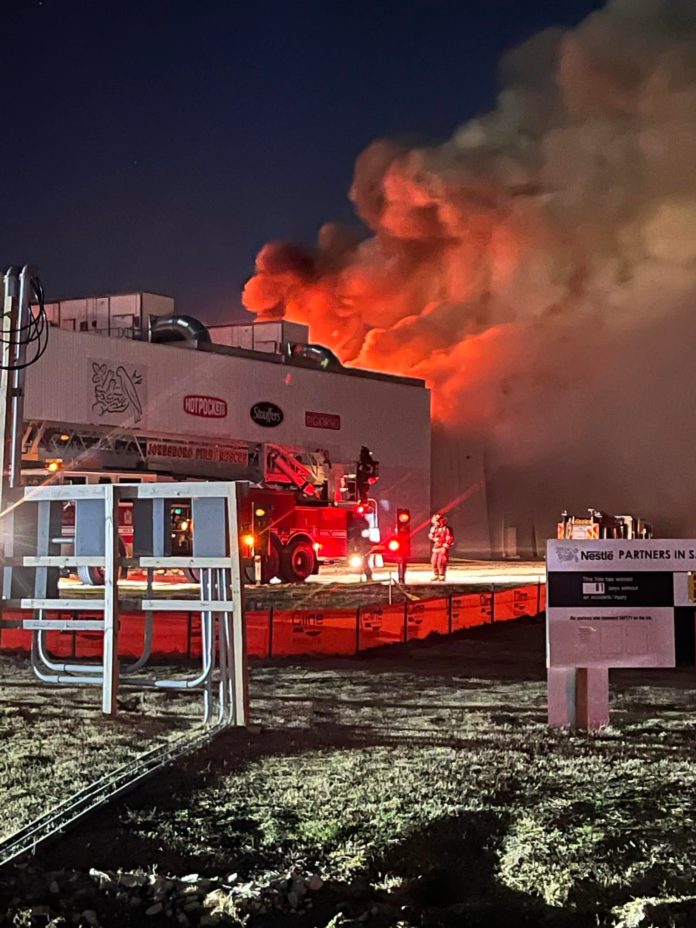Melanie Risdon
Western Standard Online
Food shortages magnified by string of destroyed food processing facilities
Last Thursday, firefighters contended with a massive blaze at California’s Taylor Farms plant. That same day, an airplane crashed into Idaho’s Gem State Processing facility.
Food shortages have been exacerbated by a string of fires, plane crashes and explosions at nearly two dozen food processing facilities across Canada and the US.
The most recent happened on Thursday in Georgia when a small plane crashed shortly after takeoff into a General Mills plant just east of Atlanta. Two occupants of the plane were killed in the crash, as reported by the New York Post.
The company also said it lost its fruit packing and carob product facility in the blaze, but said the effects will be minimal as fruit harvesting season hasn’t started yet.
Last Thursday, firefighters contended with a massive blaze at Taylor Farms packaged salad plant in Salinas, Calif. — a key agricultural region 177 km south of San Francisco. The fire broke out late Wednesday night, as reported by KTLA.
That same day, an airplane crashed into Idaho’s Gem State Processing facility — a plant said to process 18,000 acres worth of potatoes each year. The pilot of the plane did not survive, however, no employees were injured, reported Vision Times.
On April 13, firefighters from several departments in Maine helped battle a massive fire that destroyed East Conway Beef & Pork butcher shop and meat market in Center Conway, N.H.
In March, KAIT TV reported a major fire that forced the closure of the Nestle plant in Jonesboro, Ark. The plant makes frozen foods, particularly Hot Pockets.
The frozen foods plant announced its plans for a $100 million expansion last year.

The Penobscot McCrum potato processing facility in Belfast, Maine, was also destroyed by fire in March. Officials believe a deep-fryer was behind the fire, as reported by ABC affiliate WMTW News 8.
In Canada, fire crews and paramedics responded after an explosion at the Centre de valorisation de l’aliment de l’Estrie, an industrial food preparation and processing facility in Sherbrooke, Que. Five people were injured in the March explosion that turned into a major fire.
And, in late March, a fire at the Maricopa Food Pantry, a food bank in Arizona, saw 50,000 pounds worth of food burn up and yet another blaze at the Texas-based Rio Fresh severely damaged the onion processing facility.
Another fire in February, sparked by a boiler explosion at a potato chip plant south of Hermiston, Ore., sent several people to hospital with minor injuries. The Shearer’s Food plant, as reported by The Oregonian, supplies much of the Western US with potato and corn chips.
A third fire in February caused the Louis Dreyfus Company’s Claypool, Ind., soybean processing and biodiesel plant — the largest fully integrated soybean processing plant in the US — to suspend production. Thankfully no injuries were reported.
Firefighters responded to a fire in January at the Cargill-Nutrena plant in Lecompte, La. The fire took more than 12 hours to put out, as reported by KALB-TV, an NBC/CBS/CW-affiliated television station.
A fire in December caused more than $100,000 in damages to a San Antonio food processing plant. KTSA-107.1 reported there were no injuries as a result of the fire.
A fire in mid-September at the JBS USA beef processing plant in Grand Island, Neb. halted operations in the facility that typically processes about 6,000 head of cattle daily.
Although the fire damaged a portion of the facility, the company, at the time, released a statement that said the fire did not impact the primary production area, as reported by Reuters.
According to the company’s customer service department, Patak Meat Production is operating at a “much reduced” capacity, but hopes to complete repairs in the coming months and will then regain full operational capacity.
In July, Firefighters battled a large fire at the River Valley Ingredients plant in Hanceville, Al. The cause of the fire, as reported at the time by NBC affiliate WVTM-TV, was unknown.



The idiots that say this is fake news do so by saying these fires predate Biden’s comments, like they didn’t have a plan, or that the plan started when Biden said … IDK, Good Evening, I guess. Wake up and get these folk out of our conversations. If they wanta speak, do so, then shut up. Touch my words I’ll crack your knuckles.